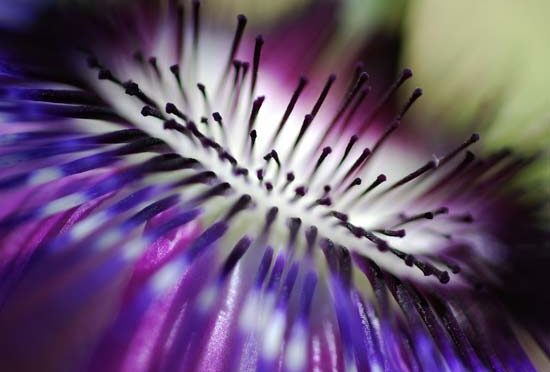It is well known that sleep is vital for human organisms. It helps us to recover from our everyday activities and “recharge our batteries”. Sleep is an exceptionally crucial element for shaping a good sports figure as muscle growth is known to occur during deep sleeps.
According to recent studies, about 1/5 of people worldwide regularly suffer from insomnia. There are some plants that have favorable effects on our sleep. Which ones are the most popular and how do they affect out sleep?
Here are some powerful plants that can help soothe your nerves and aid in your insomnia.
Valerian
A popular grass or shrub belonging to the group of dicotyledonous plants and famous for its sedative features. Valerian 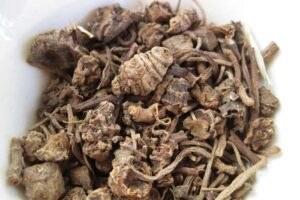 (Valeriana officinalis, Valerianaceae) has small flowers and forms clusters. Scented oils used in medicine and perfumery are extracted from the roots of different types of valerian.
(Valeriana officinalis, Valerianaceae) has small flowers and forms clusters. Scented oils used in medicine and perfumery are extracted from the roots of different types of valerian.
The plant is mainly found in the area around the Mediterranean Sea, in the moderate and cold regions of Euroasia and North America, as well as in South America – in the Andes.
Valerian can not only betters sleep, but also shortens its duration. So, if you suffer from insomnia, we recommend that you should drink decoction of this herb every evening for at least 4 weeks. It is crucial that valerian should not be drunk for more than the prescribed time. Otherwise, it will have the opposite effect – your nervous system will become overexcited instead of soothed.
Humulus
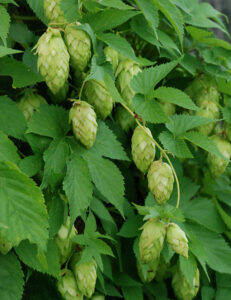
Humulus (Humulus lupulus) is a herbaceous plant which reaches height of between 3 and 6 meters. Its trunk is ribbed and covered with short curved spines. On the inside of its cone-like flowers there are essential-oil glands.
Humulus grows in damp places among shrubs and deciduous forests and mostly along rivers throughout the country up to 1000 meters above sea level.
It blooms from May to August. As it is known, humulus flowers are used for the production of beer. Humulus, combined with other herbs, affects favorably our organisms at various problems and diseases.
It can be taken alone but it will have a better effect on sleep if it is combined with valerian. Except in the form of decoction, humulus can be taken powdered.
Passiflora
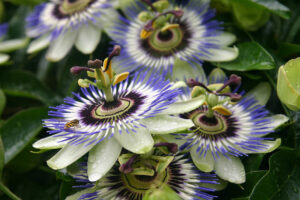 Passiflora known as “passionflower”, “flower of passion”, etc. belongs to the family of creeping heat-loving plants which bloom in yellow, blue, red and many other colors.
Passiflora known as “passionflower”, “flower of passion”, etc. belongs to the family of creeping heat-loving plants which bloom in yellow, blue, red and many other colors.
It originates from South America; there are about 500 species of passiflora all of which multiply by seeds and cuttings.
In winter it is necessary to retract it in warm places. Passiflora has simultaneously sedative and anxiolytic effects, i.e. it eliminates tension, anxiety and stress and contributes to healthy sleep. In cases of nervousness, you should take decoction of passiflora three times a day; if the problem is more serious – take two cups of passiflora before sleeping.
Lemon Balm
Lemon Balm (Melissa officinalis) is a herbaceous perennial of the family Lamiacae. It is found in South Europe and the Mediterranean region. It originates from the area around the Mediterranean Sea. It is cultivated in many European and Northern American countries.
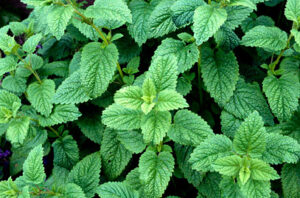
In height balm reaches 70-150 cm. Its leaves have a mild smell of lemon. In late summer small flowers full of nectar occur. They attract bees, hence the genus name Melissa (Greek for “honey bee”).
Its flavor comes from the following terpenoid chemical compounds: citronellal, geranial, linalyl acetate and caryophyllene. Lemon Balm grows in shrubs and thin forests, in grassy and rocky places throughout the country. It is predominantly popular for its anti-spasm and digestive effects.
However, Lemon balm also affects sleep restoring it and eliminating problems. While drinking the herb, it is recommended to combine it with other plants such as lemon, hawthorn and passiflora.
Hawthorn
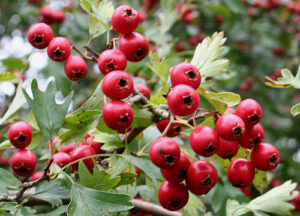 Hawthorn (Grataegus) is a sort of coated-seed plant of the family Rosaceae. There are several hundreds of species of shrubs and small trees native to temperate regions of the Northern Hemisphere.
Hawthorn (Grataegus) is a sort of coated-seed plant of the family Rosaceae. There are several hundreds of species of shrubs and small trees native to temperate regions of the Northern Hemisphere.
Hawthorn regulates health rhythm and harmonizes biological processes. It also has sedative effects on our central nervous systems.
If you have sleep problems, drink decoction of hawthorn 2-3 times a day for a period of 3 weeks. Hawthorn combined with valerian is highly recommended.
Dill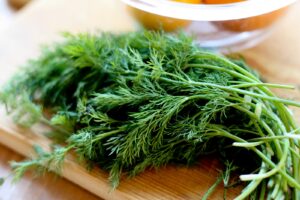
Dill (Anethum graveolens) is an annual plant used as a spice added to some meals and as a component for the production of some medicines. It has strong scent and sweet and acrid flavor.
Dill has also favorable effects on our sleep. 50 grams of dill seeds are boiled in half a liter of red wine for 15 minutes at low heat.
The mixture is left to stay for 1 hour, after that it is filtered. It is good to drink 2 tablespoons before going to bed.
St. John’s wort
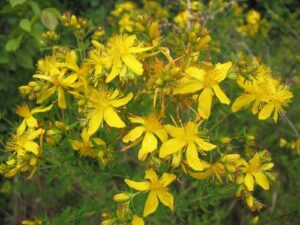 St John’s wort (Hypericum perforatum) is a herbaceous plant in the family Clusiaceae. It is twiggy and its trunk grows to 30-70 cm tall. The leaves are opposite, without footstalks, oval-elliptical, 1-3 cm long. The flowers are yellow, amassed in clusters at the top of the trunk.
St John’s wort (Hypericum perforatum) is a herbaceous plant in the family Clusiaceae. It is twiggy and its trunk grows to 30-70 cm tall. The leaves are opposite, without footstalks, oval-elliptical, 1-3 cm long. The flowers are yellow, amassed in clusters at the top of the trunk.
There are a lot of stamens inosculated in their base in three bundles. The fruit is a 3-nest casing. St John’s wort blooms from May to September.
The wide-spread name of the herb is “Christ’s blood” or “Christ’s wonderworker”. It is traditionally picked up on 24 June (St John’s Eve) and in many western countries it is called “the herb of St John”.
It has opiate effects, betters the quality of our sleep (including the sleep of people suffering from insomnia and overexcitement); it does not cause the feeling of morning lethargy. St John’s wort should not be used for long period of time as its substances gather in human organisms.
Essential oils for massage
The essential oils extracted from the following plants are highly recommended for disturbed sleep: cananga odorata, jasmine, lavender, cedar, rosewood, tangerine, sandalwood, balm, vetiver, grapefruit, frankincense, valerian, oregano, and bergamot. Add several drops of essential oil of one of the above-mentioned plants to almond oil.

